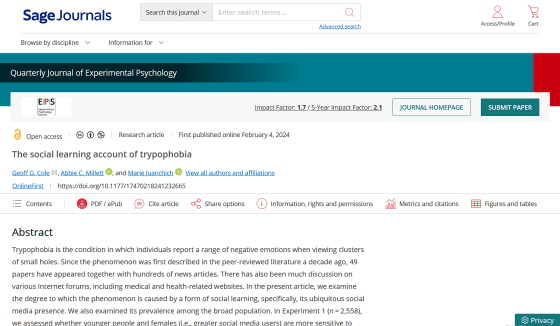The internet may be exacerbating the 'agglomeration phobia,' a condition that causes disgust for clusters of small holes or bumps

The social learning account of trypophobia - Geoff G. Cole, Abbie C. Millett, Marie Juanchich, 2024
https://journals.sagepub.com/doi/10.1177/17470218241232665

Internet Could Worsen Our Fear of Small Holes, Psychologists Say : ScienceAlert
https://www.sciencealert.com/internet-could-be-worsening-our-fear-of-small-holes-psychologists-say
Agnophobia first appeared in scientific literature in 2013, and is not yet officially recognized as a medical phobia at the time of writing. A 2013 paper reported that about 15% of people have agnophobia, but a 2023 large-scale study of young people in China found that 17.6% of people have agnophobia.
Some people may have first learned about claustrophobia on the Internet, as it is often discussed on Internet bulletin boards and social media. Images of lotus thalassophobia, which are collages of human skin and other objects, have become memes and are sometimes used for harassment.
Clicking on the image below will remove the mosaic and reveal the lotus thalasso, which is said to be disgusting to people with swarm phobia. In lotus collages, the thalasso is more extremely full of holes and creepy colored grains lined up in rows.

A new research team led by psychologist Jeff Cole of
The results showed that about a quarter of the subjects who had claustrophobia had never heard of it before, suggesting that some people are truly born with it.
However, it was also found that those who had heard of claustrophobia in the past were significantly more likely to have claustrophobia. Of those who had heard of claustrophobia, 64% said they had learned about it via the internet or social media. 'The widespread presence of claustrophobia on the internet suggests that this may contribute to the social learning aspect of the phenomenon,' the research team said.

It's not surprising that phobias are socially learned, and other phobias, such as those of snakes and spiders, are often developed because people are scared of snakes or because their family members were scared when they saw a spider. However, since phobia of the swarm has become a meme on the Internet, it's possible that a significant number of people have been influenced by the Internet.
While it's unlikely that people with claustrophobia are actually threatened by clusters of tiny holes or particles, the team believes that claustrophobia may have evolved into fear or disgust due to its similarity to potential threats to human health, such as the spread of parasites, infections, and decay.
'An alternative internet-mediated explanation for claustrophobia is that people who were previously unaware of the condition may discover that they are sensitive to holes and seek information via the internet, which confirms their previous suspicions,' the team said.
◆ Forum is currently open
A forum related to this article has been set up on the official GIGAZINE Discord server . Anyone can post freely, so please feel free to comment! If you do not have a Discord account, please refer to the account creation procedure article to create an account!
• Discord | 'Are there people around me who suffer from claustrophobia?' | GIGAZINE
https://discord.com/channels/1037961069903216680/1252183954145148928
Related Posts:
in Science, Posted by log1h_ik







